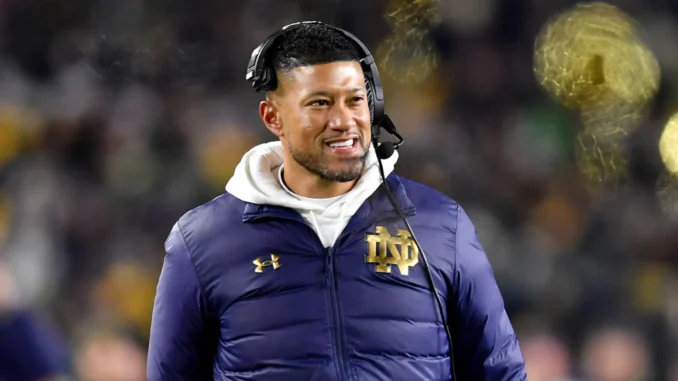
In a dramatic and highly consequential decision, the NCAA has imposed a postseason bowl ban on the University of Notre Dame’s storied football program. This sanction comes after the governing body of collegiate athletics concluded a months-long investigation into multiple recruiting violations committed by members of the coaching staff. The fallout is sending shockwaves throughout college football, as Notre Dame, one of the sport’s most historic and celebrated programs, faces serious repercussions both on and off the field.
According to sources familiar with the investigation, the violations center around impermissible contact with high school prospects during restricted periods, as well as unauthorized visits and communications that blatantly disregarded NCAA recruiting rules. Several incidents involved former assistant coaches who arranged in-person meetings and exchanged messages with recruits well outside the allowable contact windows.
One notable infraction involved a former assistant coach meeting a top-tier recruit during an unsanctioned visit to a high school in the Pacific Northwest. Other violations included a coach allegedly sending repeated text messages and arranging unofficial meetings that were neither reported nor approved. The NCAA classified these as Level II and III violations, reflecting a combination of moderate to serious breaches of compliance.
The most significant penalty imposed by the NCAA is a one-year postseason bowl ban, which means the Fighting Irish will be ineligible for any bowl appearances following the upcoming season—regardless of performance or rankings. This sanction is a major blow to the team, its fanbase, and the university, particularly given Notre Dame’s status as an independent powerhouse with national championship ambitions.
In addition to the bowl ban, the NCAA handed down several other penalties:
-
A reduction in official and unofficial recruiting visits for the upcoming recruiting cycle.
-
A temporary ban on off-campus recruiting activities.
-
A financial penalty in the form of a fine payable by the university’s athletics department.
-
Mandatory compliance training for all football staff members.
The penalties are designed not only to address past misconduct but also to reinforce the importance of accountability and adherence to recruiting rules moving forward.
Notre Dame’s athletic director issued a public statement expressing deep regret over the violations, while reaffirming the university’s commitment to integrity and NCAA compliance. He acknowledged that while the infractions were not malicious in intent, they nonetheless reflected a failure of oversight and discipline within the football program.
Head coach Marcus Freeman, who took over the program following the departure of Brian Kelly, also addressed the situation in a press conference. Freeman stated that while the violations occurred under previous staff configurations, he takes full responsibility for the program’s current and future compliance efforts. He pledged full cooperation with NCAA officials and announced new internal policies aimed at preventing any similar issues from arising in the future.
The bowl ban casts a shadow over what was shaping up to be a promising season for the Fighting Irish. With a talented roster and high expectations, the team now faces the challenge of maintaining focus and motivation despite being shut out of postseason opportunities.
The news also complicates Notre Dame’s recruiting efforts. Prospective athletes may now view the program with added scrutiny, and rival schools are likely to use the sanctions as a competitive edge in their own recruiting pitches.
While the sanctions represent a major setback, Notre Dame’s leadership has made it clear that they intend to use this moment as a turning point. The program will implement enhanced compliance protocols, increase transparency in recruiting practices, and focus on rebuilding trust within the collegiate sports community.
For now, however, the Fighting Irish will have to navigate the season under a cloud of controversy—fighting not for a championship, but to restore their reputation and prove that one of college football’s most iconic institutions can rise above adversity.
Leave a Reply